Uttar Pradesh Health Systems Strengthening Project
The Johns Hopkins Uttar Pradesh Health Systems Strengthening Support Project (HSSSP) team at BSPH provides technical and advisory support in collaboration with UP-TSU partners in the areas of health systems strengthening, analytics and capacity building. As specific analyses or field studies are identified, the HSSSP team plays roles ranging from facilitation and training to oversight of study implementation, analysis, and communication.
Our team comprises of faculty, staff, and students who are based in Lucknow, Gorakhpur, and Baltimore.
About Uttar Pradesh
Lucknow is the capital as well as one of the 75 districts that comprise Uttar Pradesh (UP).
4th
largest state in land-size in the north-central part of India.
240
million people were estimated to live in UP in the year 2022, making it the most populous state in India.
52%
of the total population of UP is in the age group of 20-59 years.
197
was the Maternal Mortality Ratio in UP in 2018, which is 45% lower than that in 2009.
77.73%
of the population in UP resides in rural areas.
40.5%
of the disease burden is contributed to by Communicable, Maternal, Neonatal, and Nutritional Diseases (CMNND).
47.9%
of DALYs are contributed by the NCDs, out of which injuries contribute to 11.6%
While health indicators in UP have been improving in recent years, maternal, neonatal, infant and child mortality rates remain substantially higher in UP than in most of the rest of India. Measures of acute and chronic malnutrition are also among the poorest in the country. The drivers of these poor health indicators of UP are complex and multifaceted. Addressing the challenges within the health system requires a holistic approach which considers the linkages between health systems processes, institutions, regulations, and governance. There is an urgent need to enhance the overall capacity of health system through a system strengthening approach to improve reproductive, maternal, child health, and nutrition as well as various communicable and non-communicable diseases.
The Bill & Melinda Gates Foundation signed a memorandum of understanding with the Government of UP (GoUP) to provide technical assistance toward addressing many of these challenges and improving health indicators in the state. The Uttar Pradesh Technical Support Unit (UP TSU) was established by the University of Manitoba (UM) to provide a platform for this support to the state government. The Department of International Health at the Johns Hopkins Bloomberg School of Public Health (BSPH) is one of several organizations comprising the UP TSU and leads several health systems strengthening components.
BSPH has also collaborated with local partners to undertake a range of project activities, with the aim to transition many of the functions to them. Engaging with these partners is critically important for building and strengthening institutions, systems, and capabilities for improving health outcomes. In the current phase of our project, BSPH is continuing to build on these relationships and develop new collaborations across all proposed project areas. Working together with local partners will help to ensure that local capacity is further strengthened thereby supporting the long-term sustainability of project activities. Our local partners include the All India Institute for Medical Sciences (AIIMS) in Gorakhpur and the State Institute of Health and Family Welfare (SIHFW) in Lucknow.
Our Approach
The overall approach of the HSSSP team is to provide a platform for collaborative learning and action for strengthening health systems in UP. Understanding our role as global health practitioners – the philosophy of our project is to embrace a decolonized approach to improving lives millions at a time – through capacity building, moving for local buy-in, and centering our activities around local priorities.
Health Systems Components
During the initial phase of our project, health systems experts from BSPH worked closely with the GoUP co-developing strategies to improve human resources for health across the state, developing a plan for strengthening government health institutions, and improving the use of data for decision making. In the current phase of our project, the HSSP team continues to provide technical assistance in these areas while also building capacity for implementation research within the state and overall strengthening public health institutions.
Public Health Training and Capacity Building
GoUP has acknowledged the need to strengthen public health training institutions and enhance core competencies of public health workforce, as a key to improve public health outcomes of Uttar Pradesh. A wide array of activities has been conducted by BSPH under the UPHSSS project to strengthen the public health training ecosystem in the state at individual, organizational and systemic levels. BSPH has been working closely with the SIHFW to strengthen its organizational capacity to adequately train and support various cadres with public health and management responsibilities. Recently, BSPH has also initiated partnership with AIIMS, Gorakhpur to support health research, education and training.
Health Systems Governance
The Directorate of Medical and Health Services (DOMH) is the executive public health agency in UP. Upon request from the GOUP leadership, JHU is supporting organizational strengthening efforts focused on the DOMH. The HSSSP team has conducted detailed organizational assessments to identify various factors affecting organizational performance in the DOMH. Based on these assessments, the HSSSP team along with UP TSU partners is now working closely with DOMH leadership to facilitate development of the Mission, Vision and Core values of the DOMH. Further, efforts to strengthen delivery of the identified core and support functions of the DOMH through organizational design and organizational behavior interventions are underway.
HRH Policy Strengthening
The following overarching objectives guide the strategy for addressing the HRH issues in UP.
-
Increase overall availability of health workers in the state.
-
Promote distribution of health workers to rural and underserved areas.
-
Improve skill-mix of health workers at all levels of the system.
-
Strengthen health worker competencies to deliver core health services and functions.
-
Build health worker motivation for service provision.
-
Support individual and team performance of health workers.
Our Team
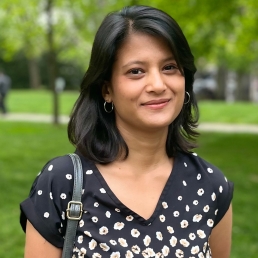
Binita Adhikari
Binita Adhikari is a public health professional from a nursing background, working at the intersection of academia and practice. She is currently a faculty member in the International Health Department of the Johns Hopkins Bloomberg School of Public Health. Her key interests are in institutional strengthening of public health organizations, human resources of health, primary health care and mental health. She has been involved in health systems strengthening practice and research in Nepal, India, Liberia, Zambia, Kenya, and Sierra Leone. Binita is committed in strengthening of primary health care system of Nepal through integration of mental health. She currently leads a non-profit, Health Foundation Nepal, that implements community health mental health projects in Nepal. She is also a member of executive team of Nepal Institute of Mental Health. She completed her MSPH degree from Johns Hopkins and is currently pursing a DrPH degree at Johns Hopkins.

Smisha Agarwal
Smisha Agarwal, PhD, MPH '09, MBA, aims at improving maternal and newborn health in low-income settings through strengthening community health systems and leveraging innovative technological solutions. Over the last decade, Smisha has developed methods for evaluating programs that employ digital tools such as mobile phones for health service delivery. She has also led a series of systematic Cochrane reviews that have been leveraged by the WHO to develop global guidelines on the use of digital tools to strengthen health services. Smisha continues to work with bilateral and multilateral agencies to support development and implementation of routine health information systems.
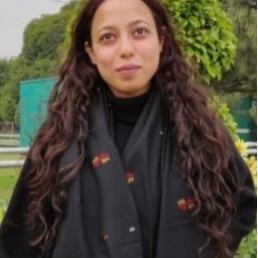
Sana Ali
Sana is a Program Coordinator with the Uttar Pradesh Health Systems Strengthening Support Project (UP HSSSP) and works on capacity building of the state's Directorate of Medical and Health Services (DOMH). She has previously supported legislators and bureaucrats as a policy researcher and has carried out extensive field work as a health journalist reporting on maternal and child health. Sana has a postgraduate degree in public policy (MPP).
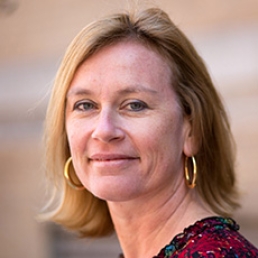
Sara Bennett
Sara Bennett PhD is Professor and Associate Chair in the International Health Department, and Director of the Health Systems Program, of the Johns Hopkins Bloomberg School of Public Health. Sara is broadly interested in health policy and systems in low and middle income countries having studied issues in health workforce (including health worker motivation, and workforce planning) health financing and health markets. Her research has also addressed institutional capacity development, health systems governance, and the use of evidence in policy and decision-making. Sara’s career encompasses both academic and policy positions. She played a significant role in the development of the field of Health Policy and Systems Research being former Chair of Health Systems Global, editor of Health Policy and Planning, and Executive Director of the Alliance for Health Policy and Systems Research at the World Health Organization. Sara is strongly committed to bridging the worlds of academia and practice, and building institutional capacity for health research internationally. She graduated from Oxford (MA), Cambridge (MPhil) and London School of Economics (PhD). You can follow Sara on Twitter @saracbennett

Cyrus Engineer
Cyrus Engineer, DrPH, '07, MHS '03, MHA, is a practice leader in health sector performance management, including quality, patient safety, and project management.
His research interests include: monitoring, evaluation, quality management, quality improvement, patient safety, impact evaluation, hospital management
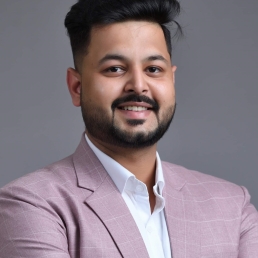
Aman Mohan Mishra
Aman is a public health professional, with 9 years of professional experience at international, national and sub-national levels providing technical support in public health sectoral reform initiatives. He holds a postgraduate degree in Epidemiology and Public Health from National University of Ireland, Cork. His interest lies in the domain of Health Systems Strengthening in the public health ecosystem which leads to providing high-quality universal health coverage (UHC) and achieving Sustainable Development Goals (SDG). Aman has worked with various development partners like WHO, UNICEF, Bank of America, and Bill Melinda Gates Foundation, where he has led various research studies, planning, and implementation. Through his work he has helped the Department of Health & Family Welfare in Comprehensive Primary Healthcare, Maternal & Child Health, Adolescent Health, Non-Communicable Diseases, while also supporting in implementation of health system and market analyses & WASH and in streamlining essential health services during and after pandemic.

Kanchan Pandey
Kanchan is multifaceted Administration Associate with a voluminous background in variety of administration duties. Kanchan holds a master’s degree in Human Resource and Finance from Bangalore University, Bengaluru. She has worked in the corporate, educational institution before foraying in the social sector. Before this role, she worked with Technical Support Unit-UP. Her forte is Administration, HR, Logistics, Event Management, Procurements, Inventory, Asset Management, and communication, both verbal and written. On the whole, she has 6 years of robust experience in her domain.

Raghukul Pandey
Raghukul is working as a Senior Research Officer in the Department of International Health, Johns Hopkins Bloomberg School of Public health. He is a public health professional and trained infectious disease epidemiologist with 25 years of experience.
He holds postgraduate degrees in Public Health and Environmental Sciences and a graduate degree in law. He is pursuing his doctorate from King George’s Medical University, Lucknow.
He supported the department of Medical Health & Family Welfare, Uttar Pradesh in many critically important tasks including the prevention and control of Acute Encephalitis Syndrome (AES) and the COVID-19 pandemic in the state.
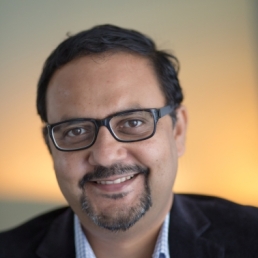
Krishna Rao
Krishna D. Rao, PhD '04, MSc, finds ways to improve access to health services in resource poor areas and the application of research methods drawn from the social sciences and economics to seek solutions to these issues. He has primarily worked in Afghanistan. Latin America, and India. Within health systems, Krishna has largely worked on three areas - human resources, primary health care, and health financing. His work in human resources has primarily focused on quality of care, task shifting, and the retention of health workers in underserved areas. In the area of health financing, his most recent research work has focused on the burden of out-of-pocket payments, expenditure tracking in health systems, and insurance programs in low and middle-income countries. Other health systems research includes studying the interactions between vertical programs and health systems, and universal health coverage (UHC) policies in low and middle-income countries. In terms of research methods, his interest lie in techniques related to measuring process and structural quality of care, cost-effectiveness analysis, program impact evaluation techniques, household survey methods, and the application of microeconomics to health. He serves as an Assistant Editor of the International Journal for Equity in Health.

Daniela Rodriguez
Daniela C. Rodríguez, DrPH, MPH, studies how politics, public health, and evidence intersect in policies that impact vulnerable communities around the world. Her special interests lie in evidence-informed decision-making, understanding the factors that influence policy development over time and across settings, and understanding the process of donor transition and its implications. She conducts research and evaluations in multi-disciplinary, cross-cultural teams in Africa, South Asia, and Latin America, including the Dominican Republic and Mexico. She plays several leadership, management, and coordination roles across projects, including several multi-country projects.

Harshini Devi Sampathkumar
Harshini is a public health practitioner and academic working in areas of implementation science and health systems research. Her current work includes designing and implementing innovative solutions for a more resilient health system in low and middle income country settings. Harshini's interest is in community engagement and local stakeholder buy-in for creating sustainable systems, public health training and capacity building of local institutions, and qualitative and quantitative research for more data driven initiatives in LMICs.

Shalini Singh
Shalini, is an Associate at the Department of International Health and Senior Researcher with Johns Hopkins India. Her work focuses on primary healthcare strengthening in India and LMICs. Passionate about aligning field realities with policy transformation, she currently is working on strengthening community partnerships for PHC in tribal settings of India. She is working on a collaborative governance model for responsive PHC in Karnataka, state and has reviewed global training models for developing a global prototype curriculum for CHW training.
Prior to joining Hopkins, she worked with the National Health Systems Resource Centre established by the Ministry of Health and Family Welfare, closely engaging with central, state governments, and district-level health systems across India. In this capacity, her focus was to strengthen implementation of the ASHA program and the Ayushman Bharat Health and Wellness Centres through program reviews, capacity building, technical mentoring and enabling responsive policy formulation. She also led the state team for designing and implementing pilots for UHC, prioritizing primary healthcare reforms in Karnataka, while working with the Public Health Foundation of India.
A dentist with an MPH from BSPH, she is also a member of the Delta Omega Honor Society, USA.

Swati Srivastava
Swati Srivastava, MPH, MBA, BBA is a Senior Program Support Officer, Uttar Pradesh Health System Strengthening Project. She holds a Master’s in Business Administration from IMI, Belgium and pursuing Master’s in Public Health from University of Lucknow. She has over 11 years of experience in teaching, training, management, human resources, and research in the public health and education sector. Her key interest areas include women’s health, family planning and health systems strengthening.

Brian Wahl
Brian Wahl, PhD, MPH is a health systems researcher, infectious disease epidemiologist, and faculty member in the Department of International Health at the Johns Hopkins Bloomberg School of Public Health. His research focuses on approaches for strengthening public health and management training in resource-constrained settings. He has also researched the changing epidemiology of vaccine-preventable respiratory diseases in children. He leads field studies and employs mathematical modelling to address critical questions related to vaccine program performance, optimization, and equity. He has been based in South Asia for more than a decade where he collaborates with researchers from leading institutions in the region, including those from India and Nepal.
Bhandari, Sudip, Brian Wahl, Sara Bennett, Cyrus Y. Engineer, Pooja Pandey, and David H. Peters. “Identifying Core Competencies for Practicing Public Health Professionals: Results from a Delphi Exercise in Uttar Pradesh, India.” BMC Public Health 20, no. 1 (November 17, 2020): 1737. https://doi.org/10.1186/s12889-020-09711-4.
Meghani, Ankita, Daniela C. Rodríguez, Huzaifa Bilal, Anand B. Tripathi, Vasanthakumar Namasivayam, Ravi Prakash, David H. Peters, and Sara Bennett. “Examining Policy Intentions and Actual Implementation Practices: How Organizational Factors Influence Health Management Information Systems in Uttar Pradesh, India.” Social Science & Medicine 286 (October 1, 2021): 114291. https://doi.org/10.1016/j.socscimed.2021.114291.
Sonderegger, Serena, Sara Bennett, Veena Sriram, Ummekulsoom Lalani, Shreya Hariyani, and Timothy Roberton. “Visualizing the Drivers of an Effective Health Workforce: A Detailed, Interactive Logic Model.” Human Resources for Health 19, no. 1 (March 12, 2021): 32. https://doi.org/10.1186/s12960-021-00570-7.
Sriram, Veena, Shreya Hariyani, Ummekulsoom Lalani, Ravi Teja Buddhiraju, Pooja Pandey, and Sara Bennett. “Stakeholder Perspectives on Proposed Policies to Improve Distribution and Retention of Doctors in Rural Areas of Uttar Pradesh, India.” BMC Health Services Research 21, no. 1 (September 29, 2021): 1027. https://doi.org/10.1186/s12913-021-06765-x.
Learn More
Are you interested in learning more about our team and their work supporting the health system in Uttar Pradesh? Are you interested in collaborating with us? We would love to hear from you.
